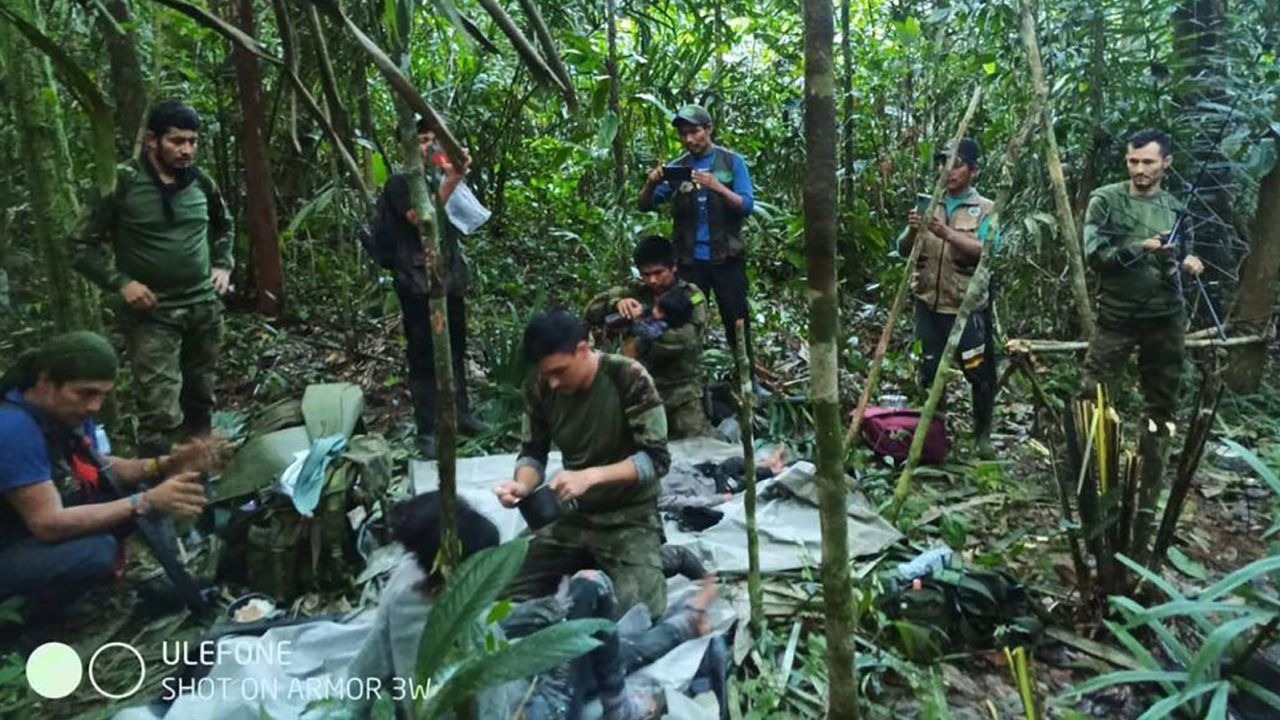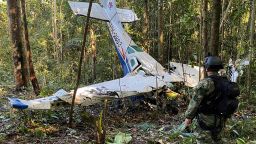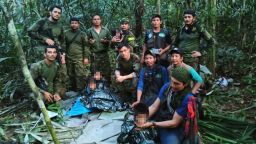Editor’s Note: Frida Ghitis, a former CNN producer and correspondent, is a world affairs columnist. She is a weekly opinion contributor to CNN, a contributing columnist to The Washington Post and a columnist for World Politics Review. The views expressed in this commentary are her own. View more opinion on CNN.
¡Milagro! ¡Milagro! ¡Milagro! ¡Milagro!
Four times the Spanish word for miracle crackled over the walkie talkies, once for each of the four Colombian children found alive after spending exactly 40 days – a number charged with mystical resonance – in the impossibly dense and danger-filled Amazon jungle after the plane they were flying on crashed, killing the three adults on board, including their mother.

Indeed, it looked like a miracle, a miracle made possible by the persistence of the rescuers and the resourcefulness of 13-year-old Lesly Jacobombaire Mucutuy, the eldest of the children and the one who took charge after the crash.
Colombians had been riveted to the unfolding drama ever since rescuers reached the crash site deep in the Guaviare region, located in the southern central area of the country, two weeks after the May 1 crash, and found the bodies of the adults but no sign of the children.
The news on Friday was almost too good to believe. It electrified a country whose people have endured more than their share of suffering.
The story of survival quickly washed over the globe, bringing a much-needed respite – news with a happy ending – to a world where stressful, depressing and simply bad news seem to be the order of the day. For a moment, we could take a break from the latest on the brutal war and man-made floods in Ukraine, from the divisiveness, the invective and the threats of violence in the United States. From all the conflicts, military, political and social that at times feel like they might tear apart the world.
Instead of writing about the arraignment of former President Donald Trump, I relished the chance to look away if only for a few hours. After all, I, too, had been mesmerized by the plight of the indigenous children wandering in the South American rainforest. I have spent time in the Amazon jungle. I didn’t think there was any chance they’d be found alive. I’m thrilled to have been proven wrong.
The more we learn about their story, the more it fills us with awe. Though our rejoicing should be tempered with the cold reality that the children lost their mother in the tragic accident.
After the crash, Jacobombaire Mucutuy first pulled her youngest sister out of the wreckage and eventually the four children were on the move together, as Jacobombaire Mucutuy put to good use the lessons she had learned as an indigenous girl, a member of the Huitoto people. She grabbed a bag of yuca (cassava) flour found on the plane, along with some more supplies – a tarp, a blanket, netting, flashlights, according to rescuers – and set out, determined to survive.
She cared for the youngest, baby Cristin, who turned 1 during the ordeal, along with Soleiny, 9, and Tien Ranoque, just 4.
The virgin Amazon jungle is the thickest, most impenetrable of any I’ve ever seen in my travels. Rescuers said it rained 16 hours a day, making it nearly impossible to hear responses to the children’s calls. The jungle is rife with poisonous snakes, jaguars, insects and all manner of dangers. The ground may have even hidden landmines from the days of the war.
And, in fact, the area is still home to armed militias. The reason the family was on the tragedy-bound plane is that Manuel Ranoque, the father of the two youngest children, had to flee the area and move to Bogotá after being threatened by groups known as the dissidents, former members of the Marxist FARC guerrillas who refused to demobilize after the government signed a peace deal in 2016.
To say the children’s chances of survival were slim is an almost laughable understatement. They seemed doomed.
But finding them became a national cause. Some 70 indigenous trackers joined more than 100 members of Colombia’s military on a mission that brought the country together like few, if any, crises have. A nation that suffered more than half a century of armed conflict, where Marxist guerrillas fought the army and right-wing paramilitaries often taking cover in the jungle. And it was in the same jungles where they held many of the thousands of kidnapping and extortion victims, as well as drug labs and ruthless drug traffickers, and where bloody battles between insurgents and the military, guerrillas and paramilitaries unfolded. But now, the country suddenly was engaged in a mission without controversy, without friends, foes or combatants. The goal was to find the children and save them.
One of the heroes of the mission was Wilson, the search dog, who has gone missing in the jungle. The children say they spent several days with Wilson, and their drawings of their time in the jungle show him. Finding him has now become the national obsession and the army has vowed that when it says it will leave no one behind, that includes Wilson.
With Wilson’s help, trackers found signs of life, a baby bottle cover, a half-eaten fruit that had been bitten into and the children’s tiny footprints. Jacobombaire Mucutuy had guided her siblings toward water. She also knew how to find edible seeds and fruits, which, if done without expertise, could quickly have led to death in a forest filled with tangles of unrecognizable vegetation.
Get Our Free Weekly Newsletter
- Sign up for CNN Opinion’s newsletter.
- Join us on Twitter and Facebook
Now recovering at a military hospital in the Colombian capital, Bogotá, the children said they took shelter at times inside tree trunks to protect themselves from predators.
Trackers said they have discovered they were close to the children – as close as 20 meters – but the dense jungle, with trees over 100 feet tall blocking the light, near constant rain and minimal visibility even when the rain stopped, made it almost impossible to spot them.
Ranoque said his children survived because Jacobombaire Mucutuy knew what to do. But he also credits the spiritual power of the jungle. “They survived,” he said, “with the powers of the grandpas, a spiritual sustenance.” He added, “We are the children of nature, so we respect nature … and in her safety, we can rest.”
Whatever the forces that made it possible for the children to survive for 40 days in the Amazon jungle, their story has been a balm for Colombia, and Colombia has shared that balm, that miracle, with a world that desperately needed a dose of good news.


